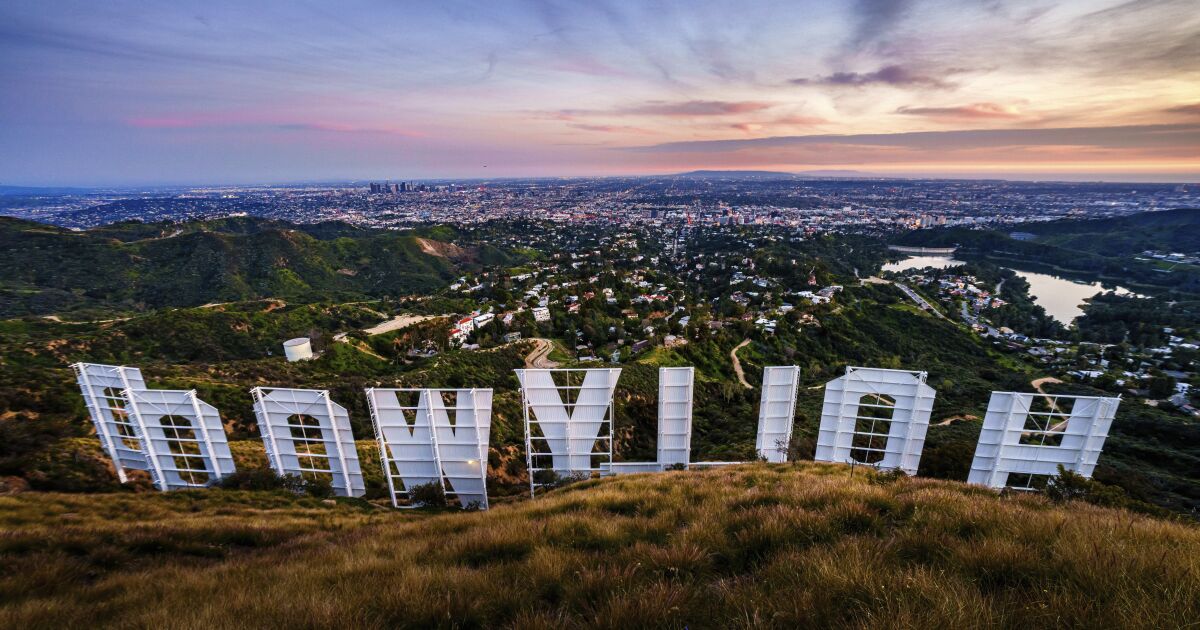
Hollywood studios will get a lucrative tax benefit they have long sought and workers on film productions will get new safety protocols they’ve wanted since the deadly “Rust” shooting under new legislation that Gov. Gavin Newsom is expected to sign into law by the end of this week.
It reflects a grand deal between the governor and state lawmakers to tackle Hollywood’s thorniest political fights in Sacramento in one sweeping bill that was made public Saturday as lawmakers race to finalize the state budget.
The legislation will extend California’s film and television tax credit for five more years with a new “refundable” feature allowing studios to receive cash payments from the state if their credits are larger than their tax bills — a perk studios have lobbied for in California for several years in the face of competition from other states.
It weaves in the set safety issue by requiring that productions receiving the tax credit follow new safety rules including hiring a safety advisor to perform a risk assessment and be on set during filming. For all productions, it will require that prop masters and armorers handling weapons have firearms training and a special state permit.
And it adds new diversity requirements that were a priority for Democratic lawmakers who have been frustrated that Hollywood workers do not reflect California’s ethnic and gender diversity. A portion of the tax credits that productions will receive will depend on meeting diversity targets. A larger slice of the tax credits will go to job training programs in community colleges that predominantly serve students of color. And the legislation requires adding a new member to the state film commission who has expertise in diversity, equity and inclusion.
“It’s the art of compromising and negotiating, finding a solution that works for everyone,” said Assemblymember Wendy Carrillo (D-Los Angeles), who played a key role in crafting the bill.
“The studios want refundability and have been wanting to have more access to these dollars. The unions have been advocating for set safety supervision, given what happened on the ‘Rust’ set. … On both ends, this was an agreeable compromise to see if it works.”
Attempts to pass set safety legislation last year stalled amid disagreements between the Motion Picture Assn. and the IATSE union that represents entertainment industry workers. They continued negotiating this year and had come to agreement on the terms in Senate Bill 735, which has been folded into the new film tax credit bill.
The author of that legislation, Sen. Dave Cortese (D-San José), said that some version of the bill for greater safety and firearms protections on film sets has been in the works since the week after the “Rust” shooting in 2021.
He recalled contacting Cal/OSHA and the Department of Industrial Relations after the fatal shooting and asking what laws were on the books to prevent that from occurring in California.
“I thought there’d be all kinds of bill history,” he said. “But there was nothing.”
This year, Cortese said, after he facilitated negotiations with the Motion Picture Assn. and IATSE units to put together SB 735, a conversation began to happen among the governor’s office, the Motion Picture Assn. and labor groups about including the film safety bill in the budget bill.
“There’s a certain efficiency and expediency in getting it done now,” he said.
Cortese said that he visited Universal and Warner Bros. sets during the drafting of the bill to see how they worked and that the firearms component of the bill is meant to codify into law what those top studios are already doing.
“Just because they do it doesn’t mean it trickles down to the rest of the industry,” he said. “We wanted it to be law so it applied to everyone, top to bottom.”
The legislation incorporates much of Newsom’s proposal earlier this year to make $330 million in film tax credits available per year from 2025 to 2030. By making the credit refundable, Carrillo said more companies will be able to take advantage of it, which should bring more productions to the Golden State.
Currently, she said, only Disney and Universal Studios benefit from the tax credit because they have larger tax bills in California due to their theme parks. Making it refundable will allow Netflix, Warner Bros. Discovery, Sony and Paramount to benefit from the program too, Carrillo said. Even if their California tax bills are smaller than the tax credit they qualify for, the new program will allow them to get a portion of the credit paid in cash.
“We are in a very competitive fight to ensure that these jobs stay in California, and they are jobs that primarily impact Los Angeles County and the city of L.A.,” Carrillo said.
The film industry legislation is one of nearly two dozen budget-related bills that lawmakers are expected to pass Tuesday as they work toward a final agreement with Newsom on the 2023-24 state budget. Negotiations have been dragging as Democrats who control the Capitol grapple with a $31.5-billion deficit.
Newsom faces a June 30 deadline to sign the budget. He is expected to sign the raft of budget-related bills lawmakers send him this week by that date.












